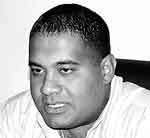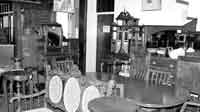| Auction house looking to cyber space for the future It's been in business since 1892; is family owned; was the first company to receive an ISO certificate in the South Asia Pacific region; and covers just about anything you want to sell, both inanimate or not, welcome to Schokman & Samerawickreme.
The auction house is looking to expand abroad and offer auction facilities over the Internet for the South Asia Association of Regional Countries (SAARC). So, all-in-all, not bad for a company that still has its head office in the place it began-Kandy. Today the auction house covers a whole spectrum of services: from auctioning antiques, paintings, furniture, vehicles, scrap, and animals, to inventory of assets and wholesale assets of banks and diplomatic and foreign missions, the list goes on but religious items are a no-no. With a turnover of Rs 50 to Rs 75 million a year the company is doing fine considering its humble beginnings. One mystery about the company is the name, as since the original founder, Mr. Schokman, left the business in the early part of the last century, nothing is really known about the man or his family. As Navinda Samerawickreme, the CEO, said, “There isn't even a photo of him,” the man who started the first auction house on the island. The business was solely based in Kandy until the early 1950s, when the present CEO's dad opened a branch in Colombo; where the use of branch is used rather loosely. As Mr. Samerawickreme explained, “Until 1996 we didn't actually own any property here in Colombo for a showroom or office. We just moved from rental to rental, conducting auctions in hired buildings or those owned by the people doing the selling: be it a bank or embassy or member of the public.” For the actual business, now that it has a home, all the auctioning is done by Mr. Samerawickreme, his brother or his dad (who is back in Kandy). But how do you learn the process of deciding on the starting prices of the stuff being sold, and the auctioning per se? “It all comes from experience. And we do have staff here that is just like us, where their families have been working here for a generation or two. Over the years you pick up the knowledge of what something is worth, as well as a price that you can start a bid with. But I'm not saying that there hasn't been the odd mistake or two over the years.” As for Mr. Samerawickreme, he started following his dad around the premises when he was 10. “And I knew that this was going to be my profession, even though my mum was hoping I'd go off in another direction.” He started working for the house at 18.For the workings of the auction house; that is down to the customers who call all the time if they have something to sell, be it from a single item to a bank's year-long repossession of cars and the like. And the thing is, according to the CEO, is “all walks of life who contact us, from multi-millionaires to the average person on the street”. And it seems there are the occasions when disagreements bubble over what the item is really worth. “But we tend to have a better understanding of the worth of something than someone who has owned it for a while,” Mr. Samerawickreme said.
What was admitted was that there were those out there who bought from auctions, only for the auctioneers to see that item again a few months later, all spruced up and selling for a good deal more than the original price. “To some people that is a business all to itself.” And it's not just furniture, vehicles and jewellery, but animals as well, with an elephant being one of the strangest. Another was auctioning off retired Air Force guard dogs to new owners. But back to the elephant: it seems it went on a murderous rampage a while back in the zoo and killed a couple of staff. The auction house was asked to help. “There weren't many bidders, but it was bought by Nilnga Delabandara, Diyawadana Nilame, or the Temple of the Tooth, in Kandy. For an auction, say at their site just of Galle Road, near Majestic City, the items for sale are on view for two days, where 100 to 150 people attend the auction. For the items sold, furniture, paintings, and the like command a 15 to 20 percent commission, whereas vehicles, real estate and most other items it is 2.5 to 3 percent. When asked about the type of person that takes part in auctions, be they the ones offering the goods or those doing the buying, Mr. Samerawickreme said you couldn't classify the person as they came from all walks of life. With the introduction of the free market in the country, the CEO admitted that they had lost some business to the big retail store that offer cheap furniture and hire-purchase monthly payments, but not enough to seriously worry the auction business. “There are those people that always want the products we offer,” Mr. Samerawickreme said. The reason for that is quality. “These days if you go to a big store, the furniture you buy might last four to five yeas before it starts looking worn out. A lot of the furniture we auction is from an era when only the best wood was used; where the products were handmade. You just don't get that quality today,” he said. And it's not just the old business world, as the company is looking to expand into the Australian and Indian markets due in part due to the ISO certification. When asked why Australia, the CEO said, “The country has auction houses for the high-price market, but not for the everyday items. So the opportunity is there.” As for the Internet move, it seems it will be similar to eBay, the hugely popular online auction site. “It will be aimed at the SAARC region. I think there is a definite future here as these days a lot of people just don't have the time to wander down to view items for auction and then come back to do the bidding.” The auction house is already working with a local software company that has international experience. The time frame for going online? “At least another year.” Another new attraction will be a vehicle auction once a month, as well as looking for a permanent site for the auction. Presently they have two furniture auctions per month. And then there is expanding the showroom to hold more items. And the most expensive item sold? After a pause, the answer was a painting by an unknown artist that went for Rs 500,000 around 10 years ago. The reason it seems was the two bidders were business rivals who wouldn't back down until the painting was sold for well over its starting price of Rs 65,000. And with that commission, no wonder Schokman & Samerawickreme is thriving today. (RI) |
||||
Copyright © 2006 Wijeya Newspapers
Ltd. All rights reserved. |

